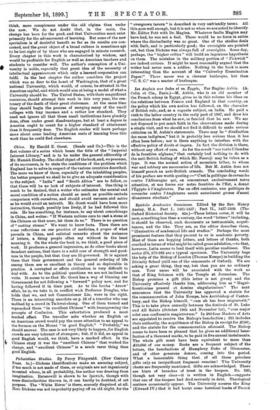China. By Harold E. Gorst. (Sands and Co.)—This is the
first volume of a series which bears the title of the " Imperial Interest Library," and is to be under the general editorship of Mr. Hamish Hendry. The chief object of the book, and, we presume, of its successors, is to state the conditions of the problem which England has to solve in respect of the various countries described. The more we know of them, especially of the inhabiting peoples, the better prepared we shall be to give an adequate consideration to the subject. " India" and " South Africa " are to follow, so that there will he no lack of subjects of interest. One thing is much to be desired, that a writer who estimates the mental and moral condition of a nation should as much as possible exclude comparison with ourselves, and should avoid sarcasm and satire as he would avoid an untruth. Mr. Gorst would have been more instructive, though possibly less lively, if he had followed this rule. He has something, for instance, to say about concubinage in China, and writes : "If Western nations care to cast a stone at the Chinese on that score, let them do so." There is no question of "casting stones." We want to know facts. Then there are some reflections on our practice of medicine, a propos of what prevails in China, and satirical remarks about the nuisance of letters, a thing people often say without in the least meaning it. On the whole the book is, we think, a good piece of work. It produces a general impression, as do other books about decadent nations, that there is a solid core of strength and good- ness in the people, but that they are ill-governed. It is against them that their government and the general ordering of life among them are so excellent in theory and so deplorable in practice. A corrupted or effete civilisation is very difficult to deal with. As to the political questions we are not inclined to write. It seems to us that Mr. Gorst has a way of blaming our Government for not following a "forward" policy now, and for having followed it in time past. As to the lorcha Arrow' affair, he is, we take it, in conflict wiL,h Professor Douglas, who holds that we, and not Commissioner Lin, were in the right. There is an interesting anecdote on p. 55 of a traveller who was mobbed by a crowd in Ta-hwei-chang. One of them turned and reproached them "in excellent Chinese " with transgressing the precepts of Confucius. This exhortation produced a most marked effect. The traveller asks whether an English or an American crowd would pay the same attention to an appeal to the Sermon on the Mount " in good English." " Probably," we should answer. The case is not very likely to happen, for English crowds are very tolerant of strangers ; but, if it did, an appeal in good English would, we think, have a marked effect. In the
• Chinese story it was the "excellent Chinese" that worked the change, and " excellent Chinese " is a much rarer thing than good English.


































 Previous page
Previous page